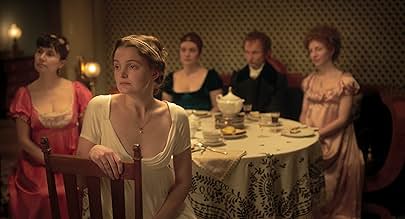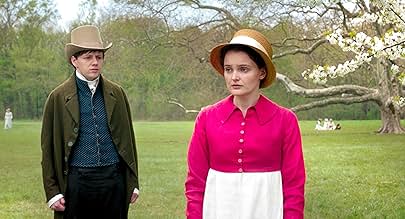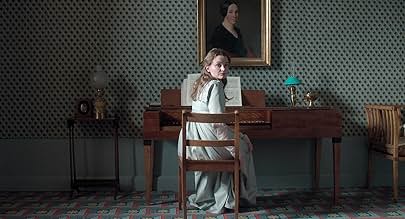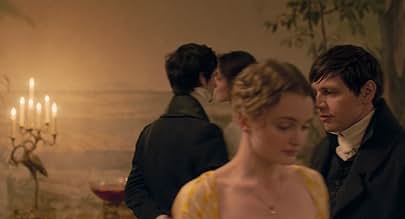Berlin, the Romantic Era. Young poet Heinrich wishes to conquer the inevitability of death through love, yet is unable to convince his skeptical cousin Marie to join him in a suicide pact. I... Read allBerlin, the Romantic Era. Young poet Heinrich wishes to conquer the inevitability of death through love, yet is unable to convince his skeptical cousin Marie to join him in a suicide pact. It is whilst coming to terms with this refusal, ineffably distressed by his cousin's insens... Read allBerlin, the Romantic Era. Young poet Heinrich wishes to conquer the inevitability of death through love, yet is unable to convince his skeptical cousin Marie to join him in a suicide pact. It is whilst coming to terms with this refusal, ineffably distressed by his cousin's insensitivity to the depth of his feelings, that Heinrich meets Henriette, the wife of a busines... Read all
- Director
- Writers
- Stars
- Awards
- 5 wins & 12 nominations total
- Director
- Writers
- All cast & crew
- Production, box office & more at IMDbPro
Featured reviews
What makes Amour Fou standout among other films of it's like is the way in which Hausner, cinematographer Martin Gschlacht and production designer Katharina Woppermann capture the essence of this time in German history with a precise visual sense. Each frame is structured precisely—especially the interiors which are geometrically defined tableaux)—each sequence layered, some look as though they are tableaux vivant. Most of the scenes are witnessed through a detached camera that allows characters to move in and out of the distinctive picturesque shots or on the contrary allows them to stand and be examined statically from a slight distance, allowing the audience to pick up on minute (but important) details like facial gestures, mannerisms, etc. which builds tension within every scene, especially the scenes in which Heinrich's awkward presence looms like a bird of doom, perpetually out of place and easily mortified by the overlapping dialogue and the rhetoric it contains (where the audience can be clued in on the historic mindset of the Berlin bourgeoisie at this time). The musical piano numbers that are interspersed through the film, happening at each party, are mystifying, and are also filmed in the layered, tableaux form of most interior scenes. Amor Fou impresses in how it handles characters, changes points of view with such ease, and handles the subject matter quietly and evenhandedly. Instead of making the film a straightforward cliché of Romantic period artists, Hausner chooses to drive her characters by honest dialogue, somewhat realistic approaches to performances and does not try and hide or romanticize the selfish, ridiculous, egotistical tendencies and mindsets of the narrative's two main characters, nor their misunderstanding of what "love" truly means. Yet, the most commendable (outside the visual mastery of each scene) is the way Hausner examines her characters non-moralistically, never harshly judgmental, nor relishing in their life altering mistakes. The story itself and the time frame it is set in are based on real events, though Hausner does not paint herself into a corner attempting to stay true to the "facts," but the obvious social and historical elements of the story (post-French Revolution and the spreading of those ideas to Germany, the inevitable fall of the Prussian Empire, and the effect of Romanticism in culture and arts of the time) play well off of the scenarios and the metaphysical tribulations of the characters. Hausner's empathy shines through as she delivers a thoughtful character study, ultimately examining the power of the mind and willpower, while at times playing delightful games with the audience, forcing us to question and to quantify how large the difference is between mental illness and true love. Hausner tops the film off with a powerful and understated ending which stays true to the entire aesthetic of the film as a whole. After her past two deliberately paced and highly contained character studies of equal visual propensity with Lourdes (2009) and Amour Fou (2014) every film lover should be on the lookout for Jessica Hausner's next.
Far from the dashing romantic image a period poet might evoke, Friedel's Heimlich moves awkwardly through the picture as a skulking, slightly greasy weirdo. He's the Seventeenth Century love child of Max Schrek's Nosferatu and How I Met Your Mother's Ted Mosby, desperately searching for his elusive dream girl. Pursuing his prospective suitors and explaining his desire for this mutual suicide with all the cold, Germanic logic of a Kraftwerk track, "First I will shoot you and then myself". Still in Hausner's depiction of upper-middle class Prussian life, it's perhaps not inconceivable that his offer is met with more of a curious enthusiasm than it is with laughter and a one-way trip to the gallows.
There's a visually cruel symmetry to the set design. The rooms at a glance are large and grand, but their interiors sparse and utilitarian. Carpets, drapes and walls are covered with maddeningly geometric, repetitive patterns and each static shot looks like the kind of uninspired Seventeenth Century painting that one might find adorning a Twentieth Century biscuit tin. The colour palate is oddly muted. The characters move in precise, robotic motions, which seem designed to minimise the energy spent. Indeed, the stately group dance in the third act seems to ironically be the least choreographed in the entire film. It's as if this world, one where the sole form of entertainment is gathering around a piano to listen to a child hammer out macabre songs, would be so repressively dull as to make the offer of a late afternoon fatality a tantalising thought. Indeed, while planning their final moments, Henriette seems to have the sheepish smile of a young woman who's been flaunting her ankles all over Berlin. That's almost all the facial emotion that we see throughout the entire ninety-six minutes.
Ultimately, it's not all that easy to ascertain what Hausner's sterile slice of period drama is trying to convey. It could be that death, like social change is inevitable, so we might as well enjoy it, rather than hide from it in denial. However, it's a little hard to walk away thinking that the past would have been anything but a torturous purgatory, of which death would have been the kindest release. Perhaps mercifully, the viewers' time there is, in cinematic terms, rather brief.
I'm usually not fond of costume drama's. This time we were lucky to have aforementioned compensations that let me easily watch the slowly developing drama without being distracted by the historic attributes. Of course, what these people motivated to act how they acted, escapes our (at least: my) understanding. But I'm a certified nerd, and does not understand anything where romantic behavior is concerned. And, as a totally different matter, that Heinrich and Henrietta can undertake two journeys without any form of chaperoning, escapes me too.
Acting is superb, to such an extent that we gradually get to understand all major protagonists better and better in the course of the movie. That Heinrich halfway tries again to convince Marie into the suicide pact, makes clear that he actually preferred her all the time (rendering Henrietta 2nd choice). Collective suicide or not, this shifting preference makes the finale still more tragic as it already would be without that complication.
that is the greatest mockery, pure parody I have come across for a long time (watch it together with the Lobster-love as another convention-, even funnier than that).
that romantic poet was such a blockhead, probably as much as everyone and every institution around him. that is laughter, looking backwards from nowadays.
on a more serious base, that is proper history of manners a la Norbert Elias. the issue here is historical sociology and psychology and class dynamics; not the biographical-individual pain of creation or romantic aesthetics.
Did you know
- TriviaThe story is based on the life of the writer, dramatist and poet Heinrich von Kleist who committed suicide together with his girlfriend Henriette Vogel.
- GoofsThe art song "Wo die Berge so Blau" composed by Ludwig van Beethoven is sung in extension by different characters throughout the movie. It was first published as part of the song cycle "An die ferne Geliebte", Op. 98, in 1816, five years after the events shown.
- How long is Amour Fou?Powered by Alexa
Details
Box office
- Gross US & Canada
- $13,702
- Opening weekend US & Canada
- $4,385
- Mar 22, 2015
- Gross worldwide
- $61,693
- Runtime1 hour 36 minutes
- Color
- Sound mix
- Aspect ratio
- 1.85 : 1
Contribute to this page
































